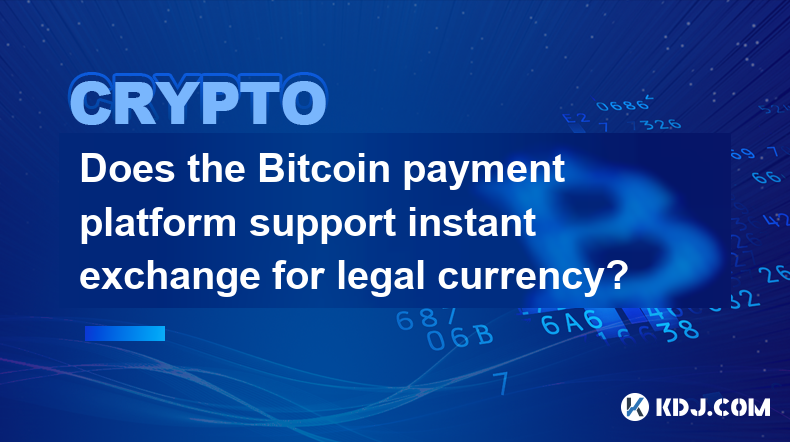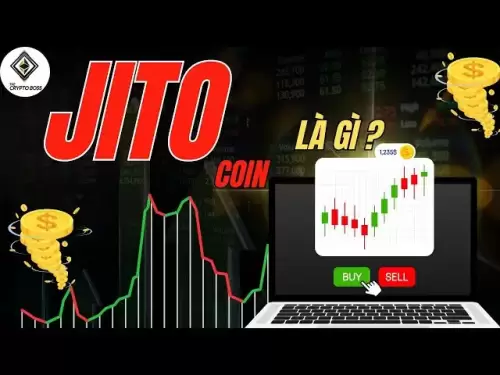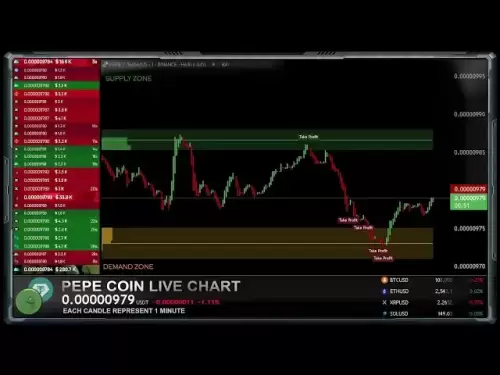-
 Bitcoin
Bitcoin $107,810.8710
-1.45% -
 Ethereum
Ethereum $2,531.4386
-1.75% -
 Tether USDt
Tether USDt $1.0000
-0.03% -
 XRP
XRP $2.2542
-0.99% -
 BNB
BNB $659.1350
-0.50% -
 Solana
Solana $148.5456
-2.40% -
 USDC
USDC $0.9999
-0.02% -
 TRON
TRON $0.2868
-0.44% -
 Dogecoin
Dogecoin $0.1666
-3.65% -
 Cardano
Cardano $0.5751
-2.36% -
 Hyperliquid
Hyperliquid $37.6845
-5.51% -
 Bitcoin Cash
Bitcoin Cash $494.9448
-0.65% -
 Sui
Sui $2.8396
-3.31% -
 Chainlink
Chainlink $13.2423
-2.59% -
 UNUS SED LEO
UNUS SED LEO $9.0482
0.02% -
 Stellar
Stellar $0.2467
-2.44% -
 Avalanche
Avalanche $17.8165
-3.63% -
 Shiba Inu
Shiba Inu $0.0...01158
-2.41% -
 Toncoin
Toncoin $2.7397
-3.42% -
 Hedera
Hedera $0.1560
-2.73% -
 Litecoin
Litecoin $85.8559
-2.34% -
 Monero
Monero $315.3710
-2.30% -
 Dai
Dai $1.0001
0.00% -
 Polkadot
Polkadot $3.3443
-2.03% -
 Ethena USDe
Ethena USDe $1.0001
0.01% -
 Bitget Token
Bitget Token $4.2888
-3.73% -
 Uniswap
Uniswap $7.3388
-1.57% -
 Aave
Aave $278.2986
-3.05% -
 Pepe
Pepe $0.0...09807
-3.67% -
 Pi
Pi $0.4563
-2.39%
Does the Bitcoin payment platform support instant exchange for legal currency?
Bitcoin payment platforms vary in their support for instant exchange to legal currency, depending on integration with fiat systems, liquidity, and transaction processing speed.
Apr 22, 2025 at 01:28 pm

The topic of whether the Bitcoin payment platform supports instant exchange for legal currency is multifaceted and requires a detailed exploration. Bitcoin, as a decentralized digital currency, operates on a network that facilitates peer-to-peer transactions without the need for intermediaries like banks. However, the question of instant exchange into legal currency involves understanding the infrastructure and services that bridge the gap between cryptocurrencies and traditional fiat systems.
Understanding Bitcoin Payment Platforms
Bitcoin payment platforms are services that allow users to send, receive, and store Bitcoin. These platforms often integrate various features to enhance user experience, such as wallet management, transaction tracking, and sometimes, the ability to exchange Bitcoin for other cryptocurrencies or fiat currencies. The primary function of these platforms is to facilitate the use of Bitcoin as a payment method, but the extent to which they support instant exchanges into legal currency varies.
The Concept of Instant Exchange
Instant exchange refers to the ability to convert Bitcoin into legal currency almost immediately. This is a critical feature for users who need quick access to funds in their local currency. The feasibility of instant exchange depends on several factors, including the platform's integration with banking systems, the speed of transaction processing, and the availability of liquidity.
Integration with Fiat Systems
For a Bitcoin payment platform to support instant exchange, it must have robust integration with fiat systems. This typically involves partnerships with banks or payment processors that can handle the conversion and transfer of funds. Some platforms may have direct banking relationships, while others might use third-party services to facilitate these transactions. The efficiency and reliability of these integrations play a significant role in determining whether the exchange can be considered "instant."
Liquidity and Exchange Rates
Liquidity is another crucial aspect of instant exchange. A platform needs to have sufficient liquidity to handle large volumes of transactions without significant delays. This means having enough reserves of both Bitcoin and the target fiat currency to fulfill exchange requests promptly. Additionally, exchange rates can impact the speed and desirability of instant exchanges. Platforms that offer competitive rates and minimal fees are more likely to provide a satisfactory instant exchange experience.
Transaction Processing Speed
The speed of transaction processing is a key determinant of whether an exchange can be considered instant. Bitcoin transactions themselves can take anywhere from 10 minutes to several hours to confirm, depending on network congestion and the transaction fee paid. However, some platforms use off-chain solutions or third-party services to bypass the need for on-chain confirmations, thereby speeding up the process. These solutions might include using custodial wallets or employing services like Lightning Network for faster transaction processing.
Examples of Bitcoin Payment Platforms with Instant Exchange Features
Several Bitcoin payment platforms have made strides in offering instant exchange features. Here are a few notable examples:
Coinbase: Coinbase is one of the most well-known platforms that supports instant exchange to legal currency. Users can link their bank accounts or use debit/credit cards to quickly convert Bitcoin into USD, EUR, or other supported currencies. Coinbase's integration with banking systems allows for relatively fast transfers, although the exact speed can vary based on the user's location and the bank's processing times.
Binance: Binance, primarily known as a cryptocurrency exchange, also offers features for instant exchange. Through its platform, users can convert Bitcoin to various fiat currencies, although the availability of instant exchange might depend on the user's region and the specific fiat currency in question. Binance's extensive liquidity and partnerships with payment processors contribute to its ability to offer quick conversions.
Paxful: Paxful is a peer-to-peer marketplace that allows users to buy and sell Bitcoin. While not a traditional payment platform, it does facilitate instant exchanges through its escrow system and integration with various payment methods, including bank transfers and digital wallets. The speed of the exchange can vary based on the payment method chosen by the seller.
Steps to Perform an Instant Exchange on a Bitcoin Payment Platform
Performing an instant exchange on a Bitcoin payment platform typically involves the following steps:
- Log into the platform: Access your account on the chosen Bitcoin payment platform.
- Navigate to the exchange section: Find the section of the platform dedicated to exchanging cryptocurrencies for fiat currencies.
- Select the amount and currency: Choose the amount of Bitcoin you wish to exchange and the target fiat currency.
- Link a payment method: If not already done, link a bank account or other payment method to receive the fiat currency.
- Initiate the exchange: Confirm the exchange details and initiate the transaction. The platform will process the exchange and transfer the funds to your linked payment method.
- Verify the transaction: Check your bank account or payment method to ensure the funds have been received.
Challenges and Considerations
While many Bitcoin payment platforms strive to offer instant exchange features, there are several challenges and considerations to keep in mind:
- Regulatory Compliance: Platforms must adhere to various regulations concerning anti-money laundering (AML) and know your customer (KYC) requirements, which can impact the speed and feasibility of instant exchanges.
- Network Congestion: High transaction volumes on the Bitcoin network can lead to delays, affecting the platform's ability to provide instant exchanges.
- Fees and Costs: The cost of instant exchanges can be higher due to the need for expedited processing and third-party services. Users should be aware of these fees and consider them when choosing a platform.
Frequently Asked Questions
Q: Can I use any Bitcoin payment platform for instant exchange to legal currency?
A: Not all Bitcoin payment platforms support instant exchange to legal currency. It's essential to check the features and services offered by each platform to determine if they meet your needs for instant exchange.
Q: Are there any risks associated with using instant exchange services on Bitcoin payment platforms?
A: Yes, there are risks such as potential delays due to network congestion, regulatory compliance issues, and higher fees for instant processing. Additionally, users should be cautious of platforms with poor security measures, as this could lead to loss of funds.
Q: How can I ensure the security of my funds when using instant exchange services?
A: To ensure the security of your funds, choose reputable platforms with strong security measures, enable two-factor authentication (2FA), and regularly monitor your account for any unauthorized transactions. Additionally, be cautious of phishing attempts and never share your private keys or login credentials.
Q: What should I do if an instant exchange fails or is delayed?
A: If an instant exchange fails or is delayed, contact the platform's customer support immediately. They can provide information on the status of your transaction and help resolve any issues. It's also a good practice to keep records of your transactions and any communication with the platform for reference.
Disclaimer:info@kdj.com
The information provided is not trading advice. kdj.com does not assume any responsibility for any investments made based on the information provided in this article. Cryptocurrencies are highly volatile and it is highly recommended that you invest with caution after thorough research!
If you believe that the content used on this website infringes your copyright, please contact us immediately (info@kdj.com) and we will delete it promptly.
- XLM Price Prediction: Is Stellar Ready for a Breakout?
- 2025-07-08 19:10:13
- Bitcoin Reserves: The New Treasury Strategy for Corporations?
- 2025-07-08 18:30:12
- Bitcoin Buys Bonanza: DigitalX, Blockchain Group Double Down!
- 2025-07-08 18:30:12
- Pump.fun's PUMP Token and Gate.io: A $4 Billion Meme Coin Gamble?
- 2025-07-08 16:30:12
- DigitalX, BTC Holdings, Funding Secured: Aussie Crypto Firm Goes Big on Bitcoin
- 2025-07-08 17:10:12
- Acquire.Fi: Navigating the Web3 M&A Landscape as a Consultant
- 2025-07-08 16:30:12
Related knowledge

How to customize USDT TRC20 mining fees? Flexible adjustment tutorial
Jun 13,2025 at 01:42am
Understanding USDT TRC20 Mining FeesMining fees on the TRON (TRC20) network are essential for processing transactions. Unlike Bitcoin or Ethereum, where miners directly validate transactions, TRON uses a delegated proof-of-stake (DPoS) mechanism. However, users still need to pay bandwidth and energy fees, which are collectively referred to as 'mining fe...

USDT TRC20 transaction is stuck? Solution summary
Jun 14,2025 at 11:15pm
Understanding USDT TRC20 TransactionsWhen users mention that a USDT TRC20 transaction is stuck, they typically refer to a situation where the transfer of Tether (USDT) on the TRON blockchain has not been confirmed for an extended period. This issue may arise due to various reasons such as network congestion, insufficient transaction fees, or wallet-rela...

How to cancel USDT TRC20 unconfirmed transactions? Operation guide
Jun 13,2025 at 11:01pm
Understanding USDT TRC20 Unconfirmed TransactionsWhen dealing with USDT TRC20 transactions, it’s crucial to understand what an unconfirmed transaction means. An unconfirmed transaction is one that has been broadcasted to the blockchain network but hasn’t yet been included in a block. This typically occurs due to low transaction fees or network congestio...

How to check USDT TRC20 balance? Introduction to multiple query methods
Jun 21,2025 at 02:42am
Understanding USDT TRC20 and Its ImportanceUSDT (Tether) is one of the most widely used stablecoins in the cryptocurrency market. It exists on multiple blockchain networks, including TRC20, which operates on the Tron (TRX) network. Checking your USDT TRC20 balance accurately is crucial for users who hold or transact with this asset. Whether you're sendi...

What to do if USDT TRC20 transfers are congested? Speed up trading skills
Jun 13,2025 at 09:56am
Understanding USDT TRC20 Transfer CongestionWhen transferring USDT TRC20, users may occasionally experience delays or congestion. This typically occurs due to network overload on the TRON blockchain, which hosts the TRC20 version of Tether. Unlike the ERC20 variant (which runs on Ethereum), TRC20 transactions are generally faster and cheaper, but during...

The relationship between USDT TRC20 and TRON chain: technical background analysis
Jun 12,2025 at 01:28pm
What is USDT TRC20?USDT TRC20 refers to the Tether (USDT) token issued on the TRON blockchain using the TRC-20 standard. Unlike the more commonly known ERC-20 version of USDT (which runs on Ethereum), the TRC-20 variant leverages the TRON network's infrastructure for faster and cheaper transactions. The emergence of this version came as part of Tether’s...

How to customize USDT TRC20 mining fees? Flexible adjustment tutorial
Jun 13,2025 at 01:42am
Understanding USDT TRC20 Mining FeesMining fees on the TRON (TRC20) network are essential for processing transactions. Unlike Bitcoin or Ethereum, where miners directly validate transactions, TRON uses a delegated proof-of-stake (DPoS) mechanism. However, users still need to pay bandwidth and energy fees, which are collectively referred to as 'mining fe...

USDT TRC20 transaction is stuck? Solution summary
Jun 14,2025 at 11:15pm
Understanding USDT TRC20 TransactionsWhen users mention that a USDT TRC20 transaction is stuck, they typically refer to a situation where the transfer of Tether (USDT) on the TRON blockchain has not been confirmed for an extended period. This issue may arise due to various reasons such as network congestion, insufficient transaction fees, or wallet-rela...

How to cancel USDT TRC20 unconfirmed transactions? Operation guide
Jun 13,2025 at 11:01pm
Understanding USDT TRC20 Unconfirmed TransactionsWhen dealing with USDT TRC20 transactions, it’s crucial to understand what an unconfirmed transaction means. An unconfirmed transaction is one that has been broadcasted to the blockchain network but hasn’t yet been included in a block. This typically occurs due to low transaction fees or network congestio...

How to check USDT TRC20 balance? Introduction to multiple query methods
Jun 21,2025 at 02:42am
Understanding USDT TRC20 and Its ImportanceUSDT (Tether) is one of the most widely used stablecoins in the cryptocurrency market. It exists on multiple blockchain networks, including TRC20, which operates on the Tron (TRX) network. Checking your USDT TRC20 balance accurately is crucial for users who hold or transact with this asset. Whether you're sendi...

What to do if USDT TRC20 transfers are congested? Speed up trading skills
Jun 13,2025 at 09:56am
Understanding USDT TRC20 Transfer CongestionWhen transferring USDT TRC20, users may occasionally experience delays or congestion. This typically occurs due to network overload on the TRON blockchain, which hosts the TRC20 version of Tether. Unlike the ERC20 variant (which runs on Ethereum), TRC20 transactions are generally faster and cheaper, but during...

The relationship between USDT TRC20 and TRON chain: technical background analysis
Jun 12,2025 at 01:28pm
What is USDT TRC20?USDT TRC20 refers to the Tether (USDT) token issued on the TRON blockchain using the TRC-20 standard. Unlike the more commonly known ERC-20 version of USDT (which runs on Ethereum), the TRC-20 variant leverages the TRON network's infrastructure for faster and cheaper transactions. The emergence of this version came as part of Tether’s...
See all articles

























































































